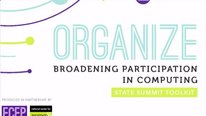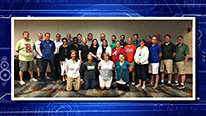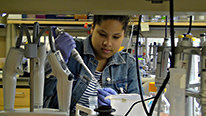- Pauline Lake
- Curriculum and Professional Development Coordinator
- CS10K: TeachIT - Scaling Mobile CSP Professional Development Online
- http://www.mobile-csp.org/
- National Center for CS Education, College of St. Scholastica
- Jennifer Rosato
- Director
- CS10K: TeachIT - Scaling Mobile CSP Professional Development Online
- http://www.mobile-csp.org/
- National Center for CS Education, College of St. Scholastica
Public Discussion
Continue the discussion of this presentation on the Multiplex. Go to Multiplex








Pauline Lake
Curriculum and Professional Development Coordinator
Hi everyone! Thank you for taking the time to stop by and view our video! My name is Pauline Lake and I have worked with the Mobile CSP project since its inception. Over the last 9 years or so, Mobile CSP has grown into an endorsed Computer Science Principles curriculum and professional development provider and has been funded by several NSF grants. Now housed under the National Center for Computer Science Education we wanted to focus our video on broadening participation in computing. We hope that you find the strategies in our video useful. If one or more of these strategies has helped you or your project, we'd love to hear your story!
Mac Cannady
Research Group Director
Hi!
Great video. Really appreciated hearing directly from the youth you work with and specifically hearing suggestions from your work for recruitment of youth to participate.
Can you say more about the context for this work and how broadly these strategies might work? For example, are these strategies specific for high school student recruitment into CS high school courses or could you imagine these strategies working in other age groups or in out of school settings? What similar or different strategies might be helpful in moving beyond high school?
Thanks!
Pauline Lake
Curriculum and Professional Development Coordinator
Hi Mac!
Thank you for taking the time to view our video and comment.
Our work has primarily been focused on CS at the high school and post-secondary level. However, strategies like talking to a counselor (which, although not specifically mentioned in the video, ties to NCWIT's C4C program) could also apply to the middle school level or any level at which administrators and counselors have an influence on which courses students take. If administrators and counselors don't understand what CS is, it's likely harder for them to understand the value it has on students. In other words, the more they know and understand, the more they can advocate for such courses.
Looking beyond high school and toward college and/or the workforce, I have worked with students through an internship opportunity called Mobile Apps for Hartford (a summer spin-off program from Mobile CSP). The internship allowed students of diverse backgrounds (many who had never had a job prior to the experience) to gain an understanding of the CS workforce and how computing skills combined with other soft skills are needed and used in the workforce today. I believe showing them firsthand the real world connections of computing allowed them to have a better understanding of how the skills in the classroom could be used and in many cases either increased or solidified their interest in CS. I realize creating such a program isn't always easy due to mostly lack of funding, but teachers could include a similar experience in their classrooms by allowing students to build apps/programs for local businesses and nonprofits as a project in their class.
Best,
-Pauline
Susan McKenney
Professor
Thanks for your video! I found the tips very concrete and convincing. I am guessing that you have learned a lot through experience, like the anecdotes told by the kids in the video (very nice!). But I wonder if you have also conducted (maybe published) studies on the theme of broadening participation? I'd be interested to read more, if that is the case....
Thanks,
Susan
Pauline Lake
Curriculum and Professional Development Coordinator
Hi Susan,
Thank you for taking the time to view and comment on our video!
Mobile CSP has definitely been a learning experience and most of our research has focused on broadening participation in CS just by offering the course/curriculum itself in schools that don't offer CS. The strategies mentioned in the video are ones that we saw emerge overtime and often heard teachers and students sharing (sometimes without realizing it was a strategy!).
Members of our team recently published "Student Engagement is Key to Broadening Participation in CS" and presented the findings at SIGCSE. Hopefully you find that to be an interesting read. It looks at the Mobile CSP course itself and what aspects of it we found to have been effective whereas the strategies in the video are ones that we feel can be applied to other courses and programs, not just Mobile CSP.
Best,
-Pauline
Susan McKenney
K. Renae Pullen
Elementary Science Specialist
Very interesting work. I really enjoyed hearing from the young people. Can you share any data or anecdotes of how Mobile CSP impacted students (especially girls) after their coursework and/or high school experience?
Pauline Lake
Curriculum and Professional Development Coordinator
Thank you for watching and commenting! While we don't formally track students after taking the Mobile CSP course, we have had students go on to win the Congressional App Challenge in their district based on the work (apps) they have done in the Mobile CSP course. We have also had girls go on to become NCWIT Aspirations in Computing Awardees (including Makenna and Lola shown in the video). Lola, in particular, mentions that she has received grants in collaboration with us to help bring coding to middle school girls. It was cut due to time constraints, but she was referring to the NCWIT Aspire IT grant which. Also, in a previous comment I had mentioned the Mobile Apps for Hartford in which Mobile CSP students were hired as interns to create apps for local non-profits. My hope is to soon analyze the data collected from the five summers of the program and publish the results.
-Pauline
Regina Werum
Hi-
Thank you for posting this interesting video with concrete suggestions on how to help recruit/broaden participation in STEM fields. Wondering: What if any research do you know of about ways to recruit adults (rather than teens or students) into STEM? Teasing out the relative impact of selection into vs. exposure to STEM as a push-factor remains one of the unsolved mysteries that also plagues our own work (see https://stemforall2019.videohall.com/p/1488, if interested). The strategies you highlight seem to stress the importance of interpersonal ties (peers, counselors, teachers) rather than the substance of any particular STEM field. Is that where the research points?
Jennifer Rosato
Director
That's a good question, Regina! There's research for undergraduate and graduate students (check out NCWIT resources at ncwit.org/resources), but I don't know of any that particularly targets adults. I think there is research that may talk about why women might switch into IT/CS careers from another one. The strategies we chose to highlight for teachers are ones that are based on influencers in a high school students life (e.g. influenced by peers, parents, teachers, and counselors). The same approach might be taken for adults as well - what and who might be influencers for them?
Jen
Gerad OShea
You mentioned the toolkit for counselors to have a conversation with students about CS. Have you seen any toolkits or communication assets (posters, handouts, etc.) that could facilitate personal encouragement or peer recruitment?
Pauline Lake
Curriculum and Professional Development Coordinator
Hi Gerad - While not specific to the two strategies you mentioned, I am aware of Microsoft's CS Toolkit which was shared by NCWIT. It contains a roadmap/timeline for recruitment, email templates, and sample flyer/pamphlets. The College Board's AP CSP page also has a recruitment toolkit with various resources. -Pauline
Sarah Dunton
Great work and great video Pauline and Jennifer. The four BPC strategies that you share are clear, relatively easy to implement, and helpful for building into cohesive strategic plans.
The inclusion of student voices drives home the need to focus on how we recruit and retain diverse students. Thanks for making a video and sharing your work with us.
Daryl Pfeif
Thank you for sharing these strategies. This was very helpful and something that we can definitely use in conjunction with the project we are working on.
Jennifer Rosato
Director
Thanks, Daryl! Just watched your video and the Digital Forensics Lab seems like a great way to learn about cybersecurity. I really like the aspect of being a "detective" and investigating problems.
Further posting is closed as the showcase has ended.